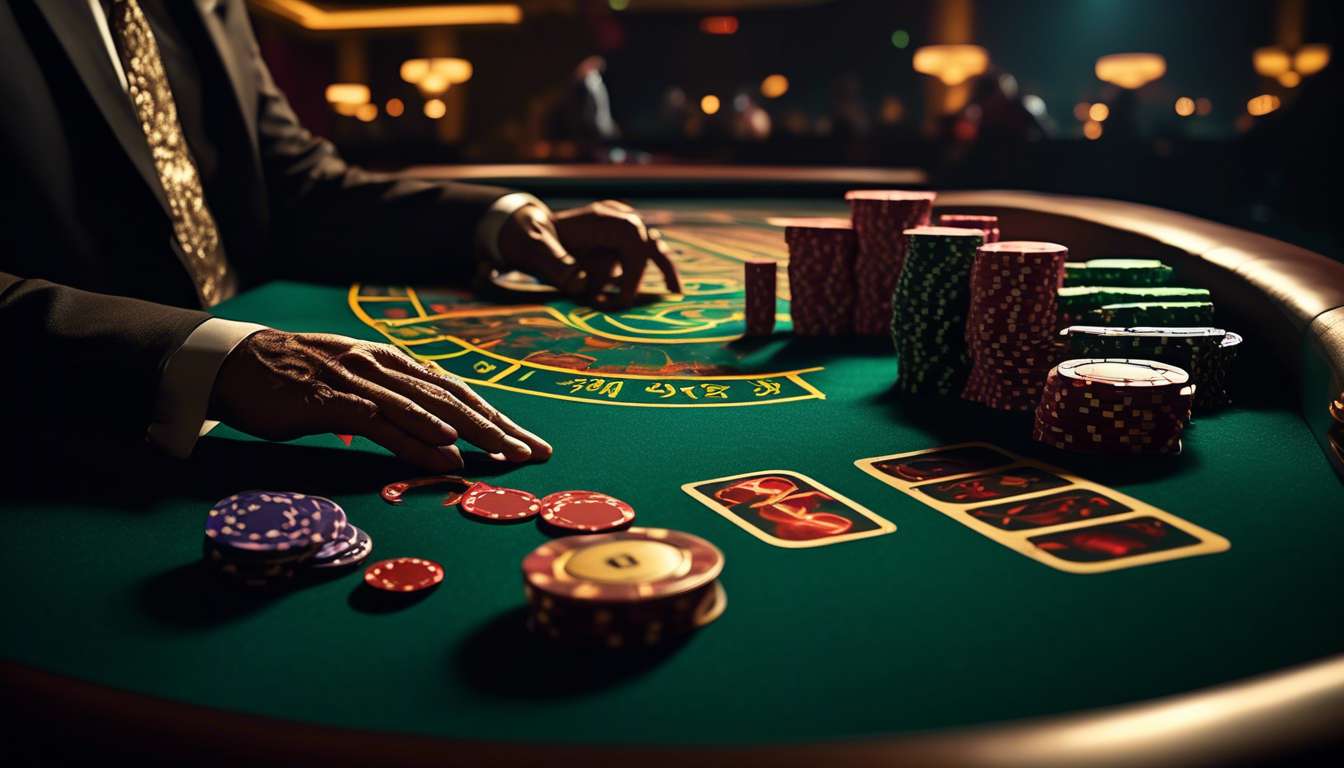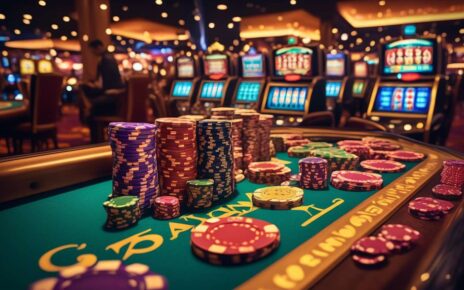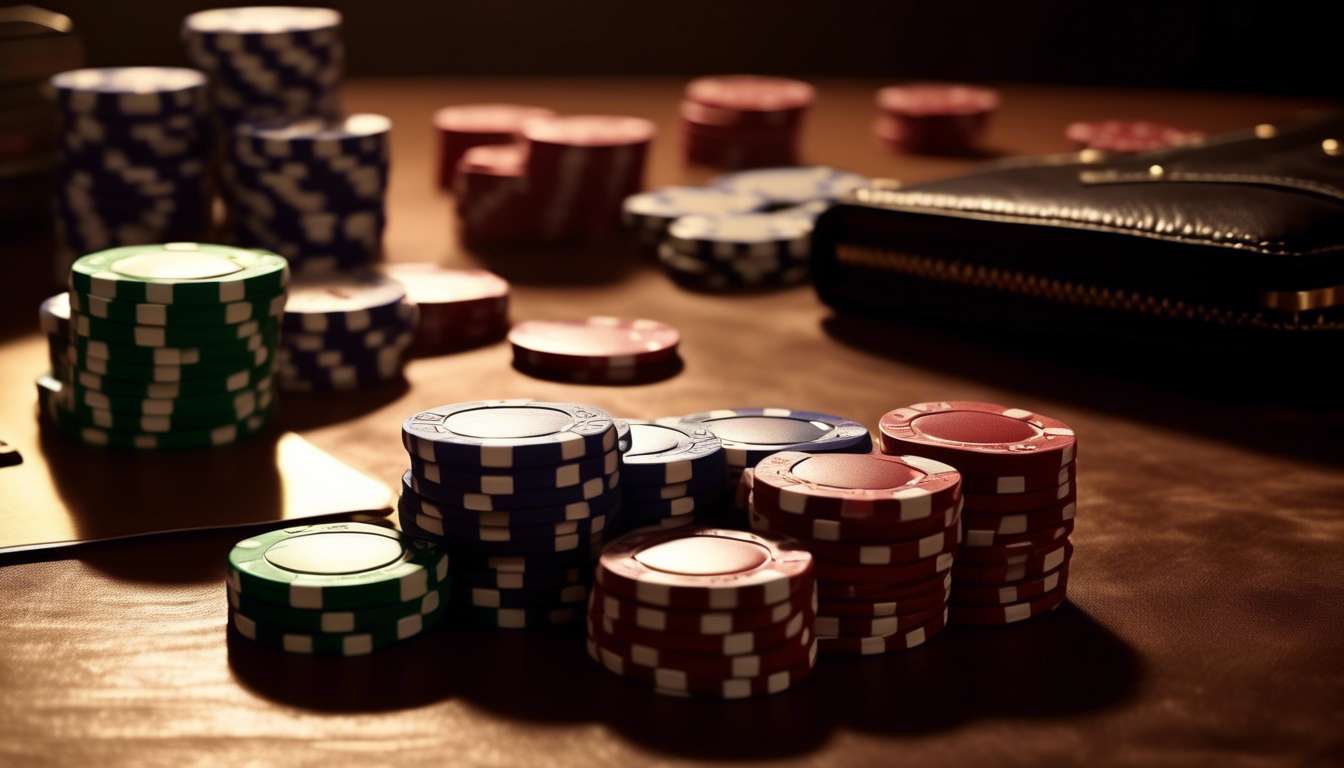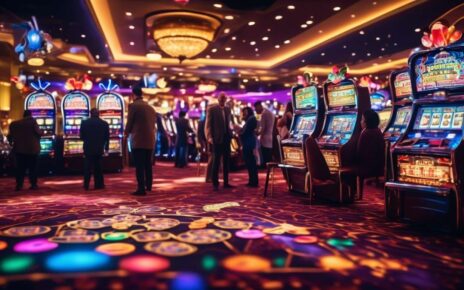As we embark on our exploration of the psychology behind casino games, we find ourselves delving into a world meticulously designed to captivate and entertain. Together, we will uncover the intricate layers of psychological tactics that casinos employ to keep us engaged and coming back for more.
From the mesmerizing allure of slot machines to the strategic appeal of poker tables, these games are crafted with a keen understanding of human behavior.
Our journey will take us through the kaleidoscope of sensory experiences that casinos offer, where:
- Sights
- Sounds
- Scents
play pivotal roles in influencing our decisions.
By examining the psychological principles at play, we aim to understand how these elements tap into our cognitive processes, influencing not only how we play but also how we perceive risk and reward.
Join us as we unravel the fascinating interplay between mind and machine in the vibrant world of casino gaming.
Cognitive Biases in Gambling
Many of us fall prey to cognitive biases that distort our decision-making while gambling. As a community of enthusiasts, we often share the same pitfalls, seeking the thrill of the game without realizing the mental traps we set for ourselves.
Cognitive biases, like the illusion of control, lead us to believe we can influence the outcome of chance-based games. We might think our lucky charm or a specific ritual can sway our luck, but this belief is a common misconception among us.
Reinforcement plays a significant role in gambling.
When we experience a win, even by chance, it reinforces our belief that our actions have a direct impact on the results, prompting us to repeat these behaviors. We crave the acceptance and validation that come with a streak of wins, making it easy to ignore the reality of randomness.
Acknowledging these biases helps us foster a sense of belonging, as we collectively strive to understand and navigate the psychological complexities of gambling.
Emotional Rollercoaster of Wins
Experiencing a win in a casino game sends us on an emotional rollercoaster, where the rush of excitement and satisfaction can be both exhilarating and fleeting. We feel a sense of belonging to an exclusive group of winners, sharing in a collective joy that’s hard to replicate elsewhere. This emotional high is a powerful reinforcement, encouraging us to keep playing and chasing that feeling again.
Our cognitive biases play a significant role in this journey. When we win, we might believe it’s due to our skill rather than luck, which creates an illusion of control. This belief can lead us to think we can somehow influence the outcome, further fueling our desire to continue playing.
Together, we find ourselves caught in a cycle where the anticipation of the next win keeps us engaged, hoping to experience that emotional peak once more. It’s a fascinating interplay of psychology that binds us to the game.
Impact of Near-Misses
Near-misses in casino games captivate us by mimicking the thrill of winning, keeping us engaged and eager to try again. We find ourselves drawn to these moments as they trigger cognitive biases, making us believe we’re just a step away from hitting the jackpot.
This illusion of control convinces us that with just a bit more effort, the outcome can be in our favor. This fosters a sense of belonging in the gaming community.
Our brains interpret near-misses as partial successes, activating the same reward pathways as actual wins. This psychological reinforcement keeps us invested, as we feel we’re part of an exclusive group of players who are "almost there."
The allure of near-misses isn’t just about the potential prize; it’s about being on the brink and feeling the rush shared among fellow gamers.
We might not always recognize it, but these near-misses cleverly exploit our desire for control and mastery, making us return to the tables time and again.
Role of Reinforcement in Gaming
Strategic reinforcement in casino games hooks us by rewarding specific behaviors, encouraging us to keep playing.
We often feel like part of a group when we experience shared excitement and anticipation. This sense of belonging is amplified by reinforcement techniques that tap into our cognitive biases.
When we win, even if it’s small:
- The immediate reward triggers a rush of excitement.
- It makes us feel like valued players in the casino community.
Reinforcement creates an emotional bond with the game as we chase the next win, believing that our persistence will eventually pay off.
- This persistence is fueled by the illusion of control.
- We think our decisions influence outcomes more than they actually do.
- By believing in our ability to control the game, we become more engaged, overlooking the random nature of outcomes.
Together, these elements foster a sense of camaraderie among players, as we share in the collective thrill of the game. This reinforces our connection to the experience.
Illusion of Control in Casinos
Many of us overestimate our influence on the outcomes of casino games, believing that our choices can sway the odds in our favor. This phenomenon, known as the Illusion of Control, feeds our desire to feel empowered and engaged within the gaming environment.
By attributing wins to our own skills rather than chance, we reinforce our belief in our ability to "beat the system." Cognitive biases play a significant role here, as they skew our perceptions and lead us to see patterns where none exist.
When we participate in activities like rolling dice or choosing numbers, we feel a sense of agency that isn’t truly there. The casino environment cleverly exploits this by offering opportunities for us to make seemingly impactful decisions, further reinforcing our illusion.
As a collective, we enjoy the camaraderie found in shared gaming experiences. Understanding the psychology behind these cognitive biases helps us recognize why we return to the tables, drawn by both excitement and the desire to belong.
Social Influence at the Tables
At the casino tables, our decisions are often swayed by the behaviors and reactions of those around us. We’re social creatures, and the need to belong can lead us to mimic others, sometimes unconsciously.
This social influence can reinforce our cognitive biases, making us believe we’re making informed choices when we’re actually just riding the wave of group behavior. The laughter, cheers, or even groans of fellow players create an environment rich with emotional cues, subtly guiding our actions.
We might feel an illusion of control when we see someone else winning and think we can do the same by copying their strategy. It’s easy to get caught up in the moment, convincing ourselves that if everyone else is betting big, we should too.
These shared experiences create a sense of camaraderie, yet they also blur our judgment.
By recognizing these influences, we can better navigate the social dynamics of the casino and make more mindful decisions.
The Aesthetics of Casino Design
Casino design captivates us with its vibrant colors, strategic lighting, and immersive layouts, all crafted to enhance our experience and encourage extended play. We find ourselves drawn into an environment that skillfully taps into our cognitive biases, making us feel both at home and on an exciting journey.
The carefully chosen aesthetics create a sense of belonging, subtly reinforcing our desire to stay and play.
As we navigate the casino floor, several design elements work together to enhance our experience:
- The seamless blend of design elements fosters an illusion of control, persuading us that we’re just one lucky spin or hand away from winning.
- The layout encourages exploration.
- Ambient sounds and visuals create a comforting backdrop, allowing us to lose track of time and immerse ourselves fully.
Ultimately, the design of casinos is a masterful orchestration aimed at fostering a community of shared excitement and anticipation, drawing us back time and again.
Behavioral Economics of Wagering
Wagering in casinos taps into our innate decision-making quirks, revealing how we assess risks and rewards in unpredictable environments. We often find ourselves swayed by cognitive biases—unconscious errors in thinking that affect our judgments.
One common bias is the illusion of control. We believe our actions can influence outcomes, like when we blow on dice or choose our own numbers in roulette, even though the results are purely random.
The thrill of potential wins keeps us coming back, thanks to reinforcement. Casinos expertly use this strategy by rewarding us unpredictably, creating excitement and the hope of hitting the jackpot. This intermittent reinforcement makes gambling enticing, as we remember the wins more vividly than the losses.
Together, these elements create a communal experience. We share stories of near-misses or lucky streaks, fostering a sense of belonging.
By understanding how cognitive biases, reinforcement, and the illusion of control shape our behavior, we can make more informed decisions in the casino environment.
Conclusion
In conclusion, diving into the world of casino games reveals a fascinating blend of psychology and behavior. From cognitive biases to emotional highs and near-miss effects, the allure of casinos is deeply rooted in human psychology.
Understanding the impact of reinforcement and the illusion of control sheds light on why players keep coming back for more.
The social dynamics and design elements further enhance the overall gaming experience, making the casino environment a complex interplay of psychology and economics.



